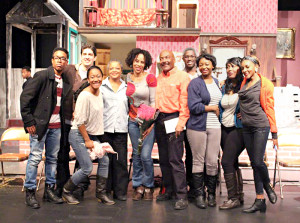‘Follow Me To Nellie’s’ Playwright Visits Cal State East Bay
December 5, 2013
Dominique Morisseau remembers when she and her family would visit her aunt and great grandmother in Natchez, Miss., one of the oldest European settlements along the Mississippi River.
Her auntie Annie’s home was always a lively place to visit; with the strumming chord progressions of blues music and the women in the house singing along to it and dancing. She visited her aunt’s home quite often as a child, the whole time not knowing it was a brothel.
“I found out [about six years ago] that she had a full career as Madam,” Morisseau, who is also a playwright and actress in New York, she said. “During the civil rights movement she used the brothel to assist activists.”
This realization, along with her interest in voting rights, gave her inspiration to write the play “Follow Me to Nellie’s.”
The play, which premiered for the first time on the West Coast at CSU East Bay last month, takes place in 1955, when Jim Crow laws and racism ruled the region. It centers on the character Nellie Jackson, a woman who owns a brothel in Natchez, Miss. Nellie is well respected for her services to the community and takes in a young voting rights activist who needs a place to live.
Since Nellie’s brothel only does business with white men in the community, the town becomes angry and begins to riot once they find out a black man is living at the brothel.
“I just thought…the generation and the generation ahead of me, we have no idea what our elders went through to get the right to vote,” Morisseau said last week at CSUEB. “This is a right we take for granted and I can’t relive it because I didn’t live at this time; but I wanted to imagine what it was like.”
Morisseau’s play recently won the Annual Premiere Stages Play Festival Competition in New Jersey and was produced by the festival with outstanding reviews. CSUEB’s theatre department performed the play in the university theatre Nov. 15-16 and 23-24. Morisseau was available after the play on Nov. 24 to answer questions from audience and cast members.
Morisseau admitted to the audience that she had to put in a lot of hard work to be at the position she is at in her career.
“It took nine years to lead up to this new wave in my life, but prior to that I’ve been hustling, I’ve been acting, I’ve been doing short plays and volunteering for people’s festivals,” she said. “I’ve been doing a whole lot in my past years to build the ground for where I am now.”

playwright Morisseau.
Morisseau recommends that if developing playwrights submit their work to as many competitions and festivals as possible, they will increase the odds of getting their work published.
“The first time I submitted my play I submitted to only two companies and neither of them accepted it,” she said. “I thought ‘nobody loves me, I’m not going to make it.’ And the next time I sent it to five and I was like ‘ugh, this is impossible!’ So the next time I sent it to 30 and I got 28 no’s and two yes’s; those two yes’s got me where I am now.”
Morisseau also firmly believes that having mentors will not only help motivate you towards your goals; but will be helpful to keep as future contacts when you need someone to produce or star in your play.
“When I was in school [at The University of Michigan] I worked with people in the playwriting field,” she said. “I worked with several women and when I left Michigan I kept those contacts so I could reach out to them. I didn’t lose any relationships.”
Morisseau’s play “Detroit ‘67” is being presented in association with the Classical Theatre of Harlem. In September 2012, her play “Sunset Baby” had its world premiere at the Gate Theatre in London.
The play “Follow Me to Nellies” was developed at the 2010 O’Neill National Playwrights Conference and produced at premiere stages in July 2011. Morisseau is currently developing a 3-play cycle on her hometown of Detroit called “The Detroit Projects.”
“I’m at a very visible place in my playwriting career but I’m not where I’m trying to go,” she said. “What keeps my fire burning is the thought that there’s always stuff left for me to say.”



